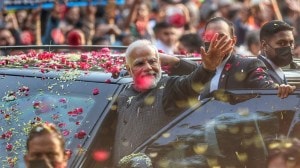PPSC: four letters that are the byword for power in Punjab
The one defining image from la’affaire Ravi Sidhu is the picture of currency notes raining from bank lockers, the lakhs and crores paid...

The one defining image from la’affaire Ravi Sidhu is the picture of currency notes raining from bank lockers, the lakhs and crores paid by wannabe PCS officers and DSPs.
The image stuck, not because of the fact that money exchanged hands for these posts, but because of the mindboggling level of the transaction.
An Oriya professor from Delhi University gave voice to the incredulity of many when he said: ‘‘If someone in my state had a crore, he wouldn’t bother about ten DSPs. It beats me why people are ready to pay so much to get into government service in this era of globalisation.’’
The sums shelled out by candidates slithering their way into Punjab’s civil service or the police have shocked even those who had become near-immune to talk of corruption. Obviously, there is something special about being a PSC officer or a DSP in Punjab.
‘‘The landed aristocracy of Punjab has always enjoyed wielding power. The long years of terrorism when PCS and police officers lorded over the state gave a taste of this to other sections as well. Corruption was a natural corollary,’’ says Dr Joginder Dayal, state secretary of the CPI and a political thinker.
Experts also blame this phenomenon on the ‘might is right’ mentality of the people. For any educated youth, who is the product of such a society, getting into the coveted PCS or police service is only a way to garner power, not a burning wish to administer the state in a better way.
Today, nothing denotes power in Punjab villages as tellingly as a police officer in uniform. And in cities, it’s the IAS and PCS officers who command this clout. Little wonder then that money is no issue when it comes to buying one’s way into this select company.
As Jasminder Singh Jakhar, a former member of the Punjab Public Service Commission who worked with its tainted Chairman Ravi Paul Singh Sidhu for over three years, puts it: ‘‘A man with 30 acres knows he will barely manage to be well-off if he works his land honestly, but he also knows that were he to sell 15 acres and buy his son a seat in the PCS, he would enjoy both riches and power. It’s this mindset that Ravi Sidhu chose to exploit.’’
The price he put on every post continued to mount, for there was no dearth of takers. ‘‘If there was any competition, it was between those who were willing to pay. And this jacked up the rates to unrealistic levels,’’ says Umrao Singh, a former state minister and MP known for his clean track record.
The phenomenon of corruption at the threshold stage, he says, became rampant during and after the years of terrorism. ‘‘Unbridled power, no accountability, an opportunity for amassing huge amounts of wealth, and the assurance of getting away lightly even if caught — all this made for a heady potion that everyone wanted to savour,’’ says Singh.
Former Director General of Punjab Police P C Dogra, who headed the force during the years of terrorism as well as peace, agrees. ‘‘Landed aristocracy already has so much money. All it needs is status and power which it is prepared to buy at any cost. Once the system cracked, it was free for all with the wealthiest people carrying the day.’’
The situation, says Dogra, also shows the utter failure of the political class. Umrao Singh concurs: ‘‘Now, the politician, no matter of what hue, does not have the skill or intelligence to keep the bureaucracy in check. Instead, he is dependent on it. What’s more, with the much discussed criminal-politician-police-bureaucrat nexus becoming a way of life in Punjab polity, he is losing the will to control it.’’ Inspector General of Police Suresh Arora, who led his men from the front against terrorists, also vouches for this.
‘‘The craving for power is natural in a semi-feudal setup. But it’s more pronounced in Punjab because of its proximity to the border,’’ he says, adding that he had never seen such a made race for a police or PCS post elsewhere in the country.
The fallout, warn the experts, will also be unprecedented. Warning about the long-term repercussions of such a brazen sale of jobs, Umroa Singh says: ‘‘I shudder to think what would be the outcome of any clash between those who are centralising power within the fold of the already powerful, and the others who are being edged out despite being meritorious.’’
That is food for thought.
Photos


- 01
- 02
- 03
- 04
- 05





























